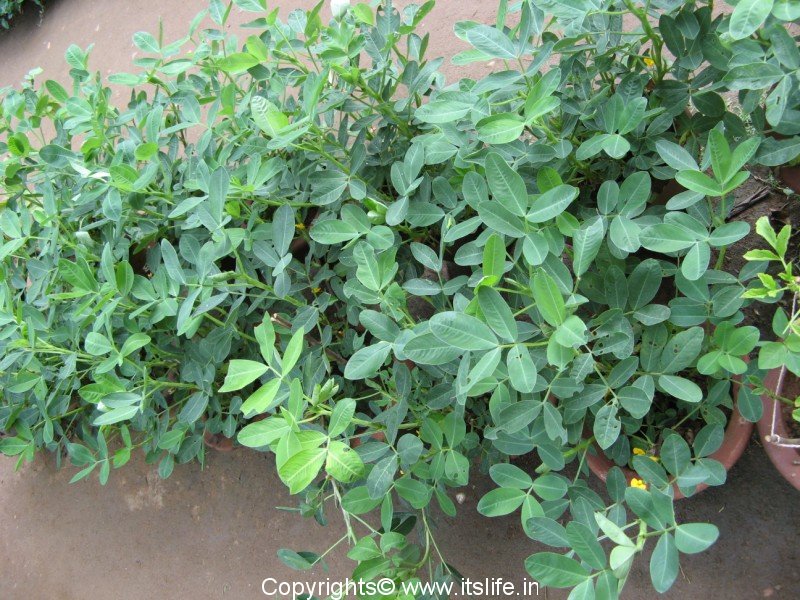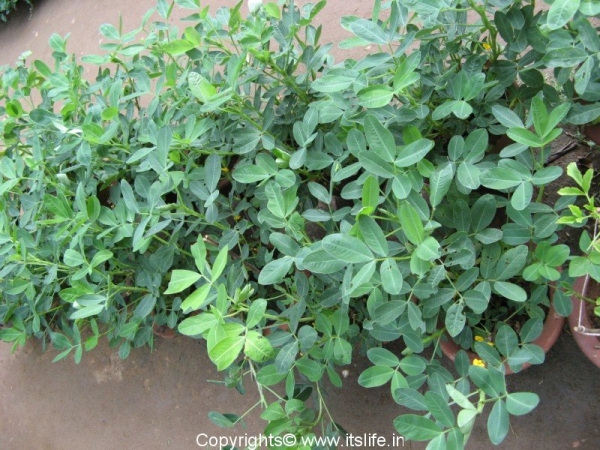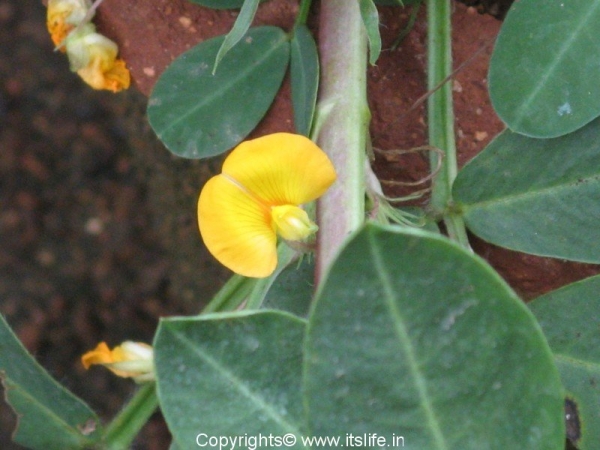Peanuts or Groundnuts belongs to the legume family Fabaceae. Botanical name is Archis Hypogaea. Hypogaea means below the earth. In Kannada it is known as Kadalekayi and Shenga, Moomphali in Hindi, and other common for peanuts are Earthnuts, Goober peas, Manila nuts, and Monkey nuts. There are different varieties of peanuts grown all over the world.
Peanuts are annual plant, which grows up to 1.5 feet. The leaves are opposite, pinnate, and each leaf is 1 to 3 inch long and wide.
The flowers are cute in the shape of a pea flower. Golden color peanut flowers are 2 to 4 cm with orange veins. After the flowers pollinate, the flower falls, the stalk at the base of the ovary, called pedicel, grows long and bury into the ground where the fruit develops into delicious peanut. The pods can be 3 to 7 cm long and the capsule may contain from 1 to 4 seeds. The entire plant is uprooted while harvesting.
Archeologists have found that peanuts existed 7,600 years ago in Peru. Peanuts have been distributed worldwide by European traders. China leads in peanut production and
India is the second largest grower of peanuts.
Uses:
Peanuts are eaten boiled, cooked, roasted, or raw. Oil is extracted from the nuts, which is very popular in India. The mild flavor of the Oil enhances some of the deep fried snacks prepared in South India, like Nippattu, Chakkali, Kodabale, Khara Sev, Thengolalu, and so on. Peanuts are popularly used in cuisines of Peru, India, Southeast Asia, Mali, Senegal, United States, and Ivory Coast.
Peanut butter is a popular spread to make sandwiches. Peanut with Jaggery known as Chikki is a favorite snack in India. Peanuts and their shells are used in Cosmetic, Polish, Textile, Plastic, Dyes, and Paints industry.
Medicinal Value:
Peanuts are a good source of niacin, folate, fiber, magnesium, vitamin A, B, C, and E, manganese, iron, zinc, calcium, and phosphorus. They are also rich in protein and are trans-fats and sodium free. Peanuts are rich in antioxidants. They are used to fight malnutrition in developing nations.
Studies have shown that peanuts can lower heart disease risk, treat blood disorders, repair the tissues, reduces cancer risk, keeps body young and fit, provides immunity against Hepatitis and Tuberculosis.
Propagation:
They can be grown by sowing seeds. They grow best in light, sandy soil. Peanut plants need 5 months of warm temperature to flourish and an annual rainfall of 20 to 40 inches.
After 120 days, the pods ripen. While harvesting, the peanut plants are pulled and inverted by hand. They are dried slowly and naturally and the pods are separated from the plant.
Festival:
There is an annual Groundnut festival held in Bangalore during December known as Kadalekayi Parishe. During this festival farmers around Bangalore vie with one another to sell their Groundnut harvest.
Recipes using peanuts:
Shenga Burfi
Kadlepuri Vaggarane
Churmuri
Sabudana Vada
Khichdi
Nippattu
Poha Kali Mirch Chivda
Shenga Chutney Pudi
Bili Yellu Pudi Chitranna
Koshimbir
Lemon Rice
Mango Rice
Groundnut Chutney
Bagara Baingan
Nellikayi Chitranna
Kadalekayi Unde
Raw Papaya Salad
Puliyogare
Shankranthi Yellu
Biscuit Salad
Poha Chivda
Avarekayi Chivda
Avalakki Chivda
Yennagai Palya
Huli Avalakki
Misal Pav
Mixed Vegetable Kootu
Kayi Sasve Chitranna
Bagara Baingan
Capsicum Peanuts Masala
Peanuts Salad
Kharada Kadalekayi Beeja




